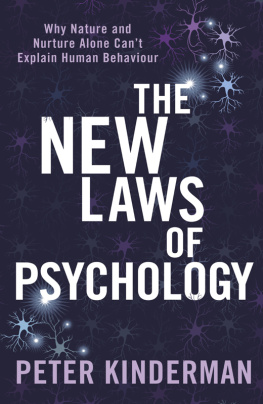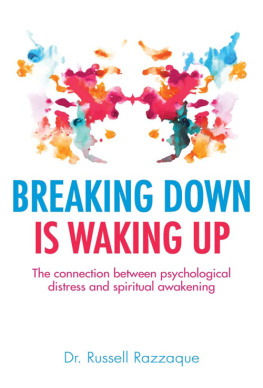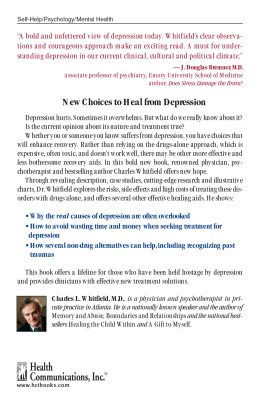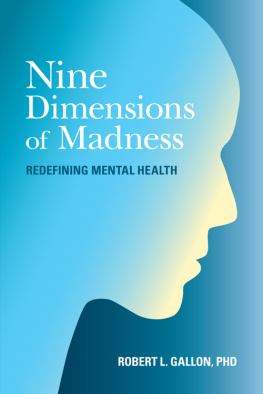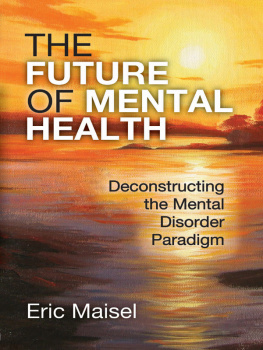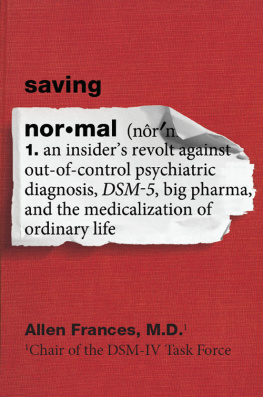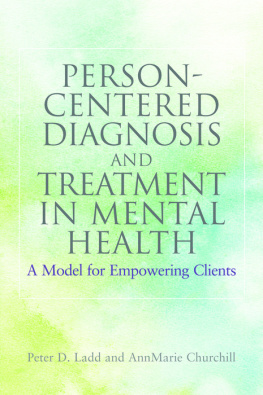Peter Kinderman is Professor of Clinical Psychology at the University of Liverpool. He studied Natural Sciences at Kings College, Cambridge before qualifying as a clinical psychologist from Leeds University. After working in the NHS as a clinical psychologist, Peter obtained a PhD from the University of Liverpool, where he studied how peoples paranoid delusional beliefs were associated with their self-esteem and how they explained events in their lives. Peters research activity and clinical work concentrate on understanding and helping people with serious and enduring mental health problems, and on how psychological science can assist public policy in health and social care.
Peter has served twice as Chair of the British Psychological Societys Division of Clinical Psychology and has been involved in a wide range of discussions of mental health issues with policy-makers and in the media.
THE NEW LAWS OF PSYCHOLOGY
Peter Kinderman
Professor of Clinical Psychology,
University of Liverpool

Constable & Robinson Ltd
5556 Russell Square
London WC1B 4HP
www.constablerobinson.com
First published in the UK by Robinson,
an imprint of Constable & Robinson Ltd, 2014
Copyright Peter Kinderman, 2014
The right of Peter Kinderman to be identified as the author of this work has been asserted by him in accordance with the Copyright, Designs and Patents Act 1988.
All rights reserved. This book is sold subject to the condition that it shall not, by way of trade or otherwise, be lent, re-sold, hired out or otherwise circulated in any form of binding or cover other than that in which it is published and without a similar condition including this condition being imposed on the subsequent purchaser.
A copy of the British Library Cataloguing in Publication data is available from the British Library
This book is not intended as a substitute for medical advice or treatment. Any person with a condition requiring medical attention should consult a qualified medical practitioner or suitable therapist.
Although we have tried to trace and contact copyright holders before publication, this has not been possible in all cases.
If notified, the publisher will be pleased to correct any errors or omissions at the earliest opportunity.
ISBN 978-1-78033-600-8 (trade paperback)
ISBN 978-1-78033-601-5 (ebook)
Printed and bound in the UK
1 3 5 7 9 10 8 6 4 2
CONTENTS
ACKNOWLEDGEMENTS
I would like to thank everybody with whom I have shared ideas about this book, and who has helped me by reading and commenting upon earlier drafts. In particular, I would like to thank members of my family, who have been both insightful and patient, and who have helped me enormously in expressing my ideas appropriately. I would particularly like to thank Jen Tomkins and Anne Cooke, whose comments have been very influential in shaping the book, although Im aware that I have discussed these ideas with very many more people unfortunately too many to name individually. I am, of course, enormously grateful to Fritha Saunders, Jamie Joseph, Charlotte Macdonald and all at Constable & Robinson who have helped make this book possible.
INTRODUCTION
Why do we behave as we do? What makes life worthwhile? Are our actions, our thoughts and our emotions best explained by looking at the biological functioning of our brains? People behave differently and have different personalities. Are these differences best explained in terms of genetic variation? Is our fate in life dictated by our biology? And if thats true, where does this leave free will?
Alternatively, are we corks bobbing along on the tide of events, the unthinking products of social circumstances? We know that peoples financial, material and social backgrounds are important. People from different social backgrounds behave differently, and major life events can have traumatic consequences so are we simply a product of these circumstances? Even if we suggest that we are the result of an interaction between our genes and the environment, that doesnt leave much room for autonomy and free will. It doesnt leave much room for humanity.
Or are we intelligent, enquiring, inquisitive creatures who make active sense of the world? Are we able to understand the world? Can we appreciate the physical environment and the behaviour of other people and form complex, fluid, elegant accounts of the things we see? Are we able to construct mental models of the world?
Although psychology is a relatively young scientific discipline, advances in psychological science over the past few years allow us to understand ourselves with unprecedented clarity. Until recently, the explanations used by psychologists, psychiatrists and neuroscientists have suppressed and compartmentalised human behaviour. Biological accounts have suggested that we are best understood as being the slaves of our brain and, ultimately, our genes. Behavioural psychologists have acknowledged that we learn, and that we are in large part shaped by the events in our lives, but traditional behavioural accounts tend to see human beings as mechanistic robots, shaped by patterns of punishment and reward.
Now, a new approach to psychology cognitive psychology is emerging, which offers a much more optimistic vision of the human condition. This approach leads to new ways of thinking new laws of psychology. It also leads to a fresh approach to mental health a focus on promoting well-being rather than treating so-called mental illness.
Cognitive psychologists see people making sense of their world, forming mental models, developing complex frameworks of understanding and acting accordingly. People are more than the raw products of their biology and are not mere pawns of the vicissitudes of life. People are born as natural learning engines, with highly complex but very receptive brains, ready to understand and then engage with the world. We develop, as a consequence of the events and examples we experience in life, mental models of the world that we then use to guide our thoughts, emotions and behaviours.
These ways of thinking about what it means to be human shouldnt be surprising or strange. In a gentle fashion, this way of thinking could revolutionise our understanding of what it is to be human, of mental health and well-being, even morality and self-awareness. In my opinion, as a clinical psychologist, if we could understand thoughts, emotions and beliefs a little better, wed understand our mental health in a different way. We would change the way we diagnose so-called mental illnesses and we would offer realistic help to people in distress. These new laws of psychology should change our whole approach to understanding and treating mental illness.
BIOLOGICAL DETERMINISM
Biological explanations of human behaviour suggest that our behaviour is the product of our brains, and that our brains are the product of our genes. These kinds of explanations were particularly popular in the early part of the twentieth century, and are still commonplace in the media on TV, the radio, in newspapers. They are seductive. Our brains are clearly responsible for a wide range of important biological functions, and biological explanations for complex human phenomena are common and powerful. The neurotransmitter dopamine (which has been linked to many street drugs and to psychosis) seems to have a role in making events seem more personally significant and salient, and has been linked to a range of mental-health problems, including psychotic experiences such as hallucinations and persecutory delusions. Serotonin (another neurotransmitter) has been linked to mechanisms of reward and social status, and therefore to depression and low self-esteem.
Next page
